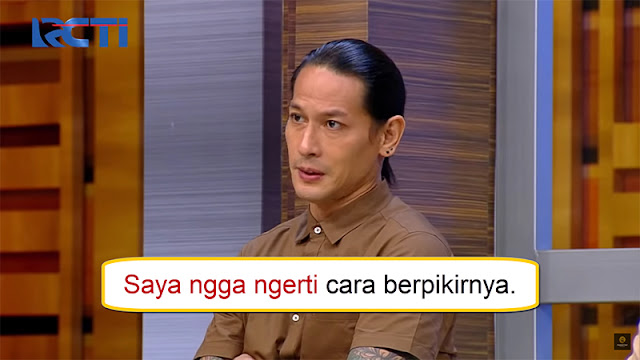- Get link
- X
- Other Apps
Posted by
Iman Prabawa
on
- Get link
- X
- Other Apps
Useful Indonesian Phrases - Halo, semuanya. Apa kabar? This time, I will talk about how to say "I don't understand" in the Indonesian language. So, if you're in Indonesia and you talk with local Indonesian people, and you don't understand what they're saying, you can use this phrase. This phrase will come in handy for you.
As always, we're going to watch scenes from movies, but this time I just found a scene from a TV Program in Indonesia where this phrase is spoken, so you can see it for yourself how Indonesian people use this phrase in real life.
If you have any questions regarding the Indonesian language, you can ask me directly. You can see how to do that on my About Me page.
If you are a beginner in the Indonesian language, you can learn step by step with My Lesson Here.
So, without further ado, let's talk about this.
I Don't Understand In the Indonesian Language
The textbook version of I don't understand in the Indonesian language is,
Saya tidak mengerti.
And below is how you pronounce this sentence.
This sentence [saya tidak mengerti] is very formal, but sometimes you will hear Indonesian people say this as follows:
Saya ngga mengerti.
[Ngga], sometimes written as [ga] or [enggak] or [engga], is the informal version of [tidak]. And below is how you pronounce this sentence.
And you can also hear Indonesian people say it as,
Saya ngga ngerti.
[Ngerti] is short for [mengerti]. You will see this sentence spoken in the scene below from a TV program called MasterChef Indonesia. Below is how you pronounce this sentence.
In a more informal situation, for example, in a daily conversation in Indonesia, you can change [saya] into [aku].
Aku ngga ngerti.
This is what you say in a casual conversation in Indonesia. And this is how you pronounce it.
If you're in Jakarta or in cities surrounding Jakarta, like Bogor, Depok, Tangerang, or Bekasi, you can change [aku] into [gue]. This is what most people in Jakarta say:
Gue ngga ngerti.
And this is how you pronounce the sentence.
Next, we will watch a video where this phrase is spoken. At the time the article is written, I only found one video, but later, if I find another video where one of these phrases is spoken, Insha Allah, I will update this article again so that you can see it for yourself how it is being used in a real-life situation.
Examples of The Phrases
This video is taken from a TV Program called Masterchef Indonesia. Let's watch the video below.
The conversation in the video with English translations is as follows.
Chef Juna: Kamu coklat campur coklat, putih campur putih? Saya ngga ngerti cara berpikirnya. Di dalam sini maksudnya kamu coklat ditambahin brown sugar lagi? (You mixed brown with brown, white with white? I don’t understand the way you think. In here, you mean you added brown sugar into chocolate again?)
Masterchef Indonesia Participant: Iya, chef. (Yes, chef.)
Chef Juna: Gunanya apa? (What for?)
As you can see, Chef Juna says this.
Saya ngga ngerti.
He uses [ngerti] instead of [mengerti, and he uses [ngga] instead of [tidak]. Saya ngga ngerti can still be used in a formal context.
Vocabulary from the scene
[Kamu] is informal for [Anda] = you.
[Campur] = to mix something.
[Coklat] can be chocolate or can be brown (color).
[Di dalam] = inside.
[Sini] = here.
[Ditambahin] is used in conversational Indonesian. It has the same meaning as [ditambahkan].
[Ditambahkan] you will find in writing, and [ditambahin] you will hear in conversational Indonesian.
[Lagi] = again.
[Iya] = yes.
[Gunanya] = This is a word that we use if we want to know the use of something. Gunanya apa, in literal translation, what is the use of this?
Read also: Ya Udah In the Indonesian Language
So, I think that's all for now. If you have any questions, just leave them in the comment section below, and I'll be happy to answer your questions. And if I find another video where one of these sentences is spoken, Insha Allah, I will update this article again. Bye now.
Location:
Indonesia
- Get link
- X
- Other Apps
Hello, I'm Iman Prabawa a.k.a Pak Guru Iman. I love to share about languages. My Instagram, @iman_prabawa

Comments
Post a Comment